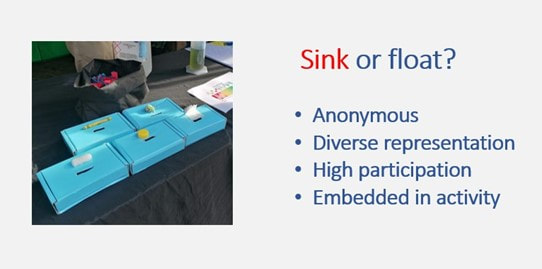Accessible Evaluation at the BIG Event
ECG Bulletin January 2024
On 26th-28th July 2023, the ThinkTank Museum in Birmingham hosted the BIG Event, the British Interactive Group’s annual conference for science communicators to share skills and experiences, develop professional links and keep up-to-date with the STEM engagement field. The content is created by its members for its members, and on 28th July, I ran a workshop on Accessible Evaluation with Dr Sarah Bearchell to showcase our learning and experience.
The workshop addressed several aspects of outreach activities, but we will focus on the contribution of the ECG’s Float or sink? game[1], which we introduced interactively: participants not only heard about what it was and its results, but also had a go.
Float or sink? is a guessing game where participants look at five types of plastic and post a coloured paper vote into a box before testing the materials in a pot of water to see if they were correct. People voted blue (float) or red (sink) for each of the materials.
At the conference, to mix things up a little, the various plastic items and vote boxes were placed around the room, some in easy-to-reach places and others in more challenging locations. The aim was to demonstrate how small access barriers massively decrease the amount of engagement with an activity, and that it is always important to think about your audience – whether they are tall or short, on foot or in a chair, colourblind or partially sighted, or anything else.
We wanted to showcase this activity because it is particularly good for engaging the hard-to-engage, such as adults who are with children (who push their children forwards but won’t take part themselves) or people who don’t want to get sticky or dirty or take anything home. The anonymous nature also means they can always lie about how wrong they were if you ask them directly!
Float or sink? is a guessing game where participants look at five types of plastic and post a coloured paper vote into a box before testing the materials in a pot of water to see if they were correct. People voted blue (float) or red (sink) for each of the materials.
At the conference, to mix things up a little, the various plastic items and vote boxes were placed around the room, some in easy-to-reach places and others in more challenging locations. The aim was to demonstrate how small access barriers massively decrease the amount of engagement with an activity, and that it is always important to think about your audience – whether they are tall or short, on foot or in a chair, colourblind or partially sighted, or anything else.
We wanted to showcase this activity because it is particularly good for engaging the hard-to-engage, such as adults who are with children (who push their children forwards but won’t take part themselves) or people who don’t want to get sticky or dirty or take anything home. The anonymous nature also means they can always lie about how wrong they were if you ask them directly!
What is it good for?
This activity not only boosts the number of engagements and gets people working together in their groups or competing, but also provides a source of evaluation, letting us know how many meaningful engagements took place, and how much people know about plastics.
Results
Most people guess correctly that a crayon would sink (red) and a plastic bag float (blue) (71-90% across all events), even when told that the plastic bag would be filled with water and submerged – it is the material being tested here, not the shape. However, silicone proves misleading, with ~80% of voters suspecting it would float – when in fact it sinks.
The pilot of Float or Sink? is discussed in the ECG Bulletin, July 2022[1], and has subsequently become an outreach staple. Evaluation of results at BIG 2023 showed that people were 50% more likely to do an evaluation activity that was easy to get to and reach than one placed slightly out of reach, and that professional science communicators guessed whether a plastic object sinks or floats incorrectly 40% of the time, the same as the general public.
References
1. Float or Sink pilot – see ECG Bulletin, July 2022, p.7.


